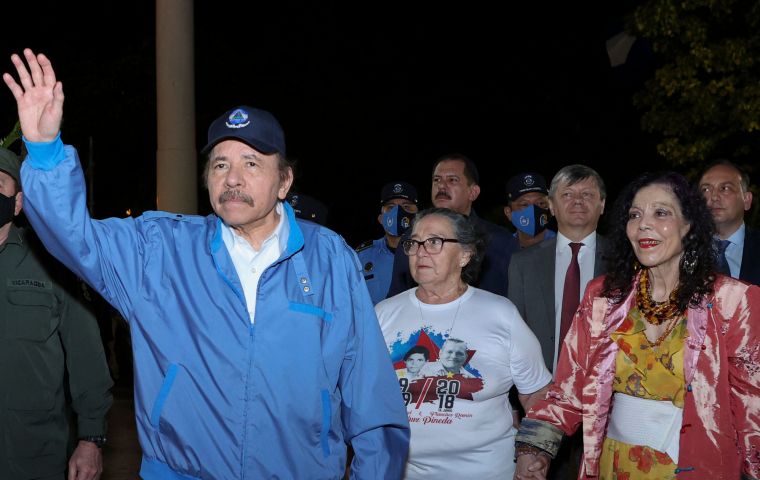MercoPress. South Atlantic News Agency
Nicaragua must still respect human rights outside of OAS, members of the organization said
 ”No, Mr. Ortega, it is not going to be so easy to leave the defense of human rights in the continent,” Uruguay’s Abdala said
”No, Mr. Ortega, it is not going to be so easy to leave the defense of human rights in the continent,” Uruguay’s Abdala said Members of the Organization of American States (OAS) Wednesday insisted Nicaragua must still respect human rights regardless of its detachment from the group effective Nov. 19, two years after announcing its decision to leave according to the applicable rules.
Nicaragua may leave the OAS but respecting “all human rights“ will continue to be one of its ”legal obligations,“ the remaining countries stressed.
In 2021, Nicaraguan ruler Daniel Ortega decided to turn his back on the OAS following the organization's refusal to recognize the 2021 elections, in which he was reelected with his rivals in jail or in exile. Those elections aggravated the crisis already gripping the country since the 2018 anti-government protests, which resulted in some 300 deaths.
The OAS ”deeply regrets“ that Nicaragua has withdrawn but emphasizes that its withdrawal ”does not leave without effect the other legal obligations for which it is responsible by virtue of its ratification of other inter-American conventions,“ reads a resolution unanimously approved by the Permanent Council, the body's executive body.
Nicaragua must still ” respect all human rights reflected in customary norms [and] in the multilateral conventions“ to which it is a party, in addition to ”those derived from general principles of international law.“
The OAS also warned Ortega that it ”will continue to pay special attention“ to the situation in the Central American country.
Uruguay’s Ambassador to the OAS Washington Abdala even launched a plea against ”the stark violence of Mr. Ortega's dictatorship“ while words such as ”disappointment,“ ”sadness“ or ”deep dismay“ were used in OAS circles to describe Nicaragua’s departure.
Ortega ”has nothing left to do, he has broken all the red lines, he has broken absolutely all of them,“ insisted Abdala, who recalled that the Sandinista leader was ”the one who let Hugo Torres die.“ Torres was a former comrade-in-arms who later became critical of the president and ended up dying in a hospital after months in jail. He is ”the one who persecutes the Church and “declares stateless persons,” Abdala added.
“No, Mr. Ortega, it is not going to be so easy to leave the defense of human rights in the continent, it is not going to be so simple, it should not be so simple and, if it were so simple, it would speak very badly of us because what are we here for? To defend principles, values, democracy, human rights,” Abdala reminded his colleagues.
Inserting a footnote to the joint statement were Brazil and El Salvador: “We take this opportunity to reiterate our perception that it is necessary to calibrate political strategies” with “constructive and collaborative approaches” because although the possibility of applying punitive measures “can be useful in some contexts” they should not be considered as “automatic mechanisms,” Brazil’s Ambassador to the OAS, Benoni Belli said.
The government of President Luiz Inácio Lula da Silva harbors the “hope that Nicaragua will be able to return to the organization in the future,” he added.




Top Comments
Disclaimer & comment rulesCommenting for this story is now closed.
If you have a Facebook account, become a fan and comment on our Facebook Page!